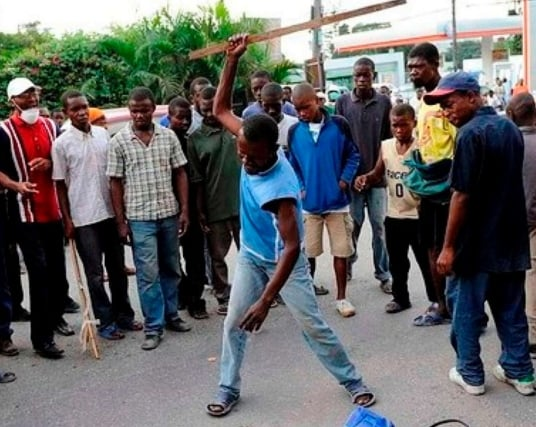On a week meant for celebration, 16 northerners travelling home for Sallah festivities met their end in the most horrific way imaginable – burned alive by a mob that appointed itself judge, jury, and executioner. What crime warranted such barbarism? Simply being northern hunters with Dane guns returning to Kano.
Trust our citizens to always take matters into their own hands when it comes to dispensing “justice.” The Uromi, Edo State incident represents everything wrong with our society’s approach to security and ethnic relations. I’m still struggling to process how a community can harbour so many savages ready to douse fellow humans in petrol and watch them burn without a moment’s hesitation.
Was there no community leader present? No police station nearby? Not a single educated person among the bloodthirsty mob? These questions haunt me as I consider the sheer depravity on display in those viral videos showing human beings treated worse than animals.
Let’s be crystal clear about what happened: vigilantes stopped a truck carrying travellers from Port Harcourt to Kano, found licensed Dane guns used for hunting, and instead of proper verification, raised an alarm that attracted locals who proceeded with their gruesome business. The resulting carnage left 16 dead, a vehicle torched, and a nation once again confronting its demons.
To be sure, the swift response from the authorities is commendable. Fourteen suspects have been arrested, with the Inspector-General of Police (IGP), Kayode Egbetokun, directing the Deputy Inspector-General (DIG) in charge of the Force Criminal Investigation Department (FCID) to take over the case. President Bola Tinubu has also condemned the killings and directed security agencies to conduct thorough investigations. Governor Monday Okpebholo of Edo State has even visited Kano to commiserate with the victims’ families.
But these after-the-fact responses, while necessary, can’t bring back the dead or erase the trauma inflicted on the survivors like Dayyabu Yahya and Mustafa Ali Kassim, who escaped by the skin of their teeth.
Come to think of it, this isn’t our first rodeo with jungle justice. Remember the Aluu Four lynching in 2012? Four university students were beaten and burned to death over rumours of theft. Or the 2021 killing of 22 travellers in Plateau State? The script remains painfully familiar – suspicion, mob formation, brutal execution, then outrage and promises of justice that rarely materialise in full.
What’s particularly disturbing about the Uromi incident is the location – reportedly near “Angle 90,” an area known for northern labourers and artisans who wait for daily work. That such violence could unfold in a place where northerners regularly gather for legitimate business speaks volumes about the underlying tensions and stereotypes at play.
This brings me to the crux of the matter – the danger of stereotyping in Nigeria. We’ve somehow decided that all Hausa/Fulani people are potential kidnappers or bandits, just as we’ve typecast Calabar people as cooks and househelps in our collective imagination. It’s as if kidnappers from other ethnic groups have collectively repented and embraced salvation, leaving only northerners to carry on the nefarious business.
The Arewa Consultative Forum hit the nail on the head when they rejected the “mistaken identity” narrative. This wasn’t simple mistaken identity – it was the deadly outcome of “deeply entrenched stereotyping and prejudices against northerners.” As they rightly noted, it’s “inconceivable and counterintuitive that ‘kidnappers’ operate openly, in plain public view, on highways through towns and communities.”
I completely agree with Ohanaeze Ndigbo’s call for the arrest and prosecution of everyone involved. Justice must not only be done but be seen to be done. The families of those killed deserve more than condolences – they need compensation and the assurance that their loved ones didn’t die in vain.
The most disturbing aspect of this entire episode is how easily Nigerians resort to violence across ethnic lines. If travellers with licensed hunting equipment can be murdered for the crime of ethnicity, what happens to the ordinary citizens going about their business? How many more innocent people must die before we learn that jungle justice has no place in civilised society?
We must commend Governor Abba Yusuf of Kano State for maintaining calm and preventing reprisal attacks. A cycle of vengeance would only deepen our wounds as a nation.
As we approach another presidential election cycle in our democracy, from next year shouldn’t we be focusing on leadership, competence, and the real issues plaguing our nation instead of which ethnic group someone belongs to? Shouldn’t our concerns be about tackling the root causes of insecurity rather than perpetuating deadly stereotypes?
The Uromi killings should force us to have uncomfortable conversations about our prejudices and how they translate into deadly consequences. Every Nigerian has the right to live and travel freely within their country without fear of being burned alive for their ethnicity or accent.
The families of the victims deserve swift justice. The surviving witnesses deserve protection. And Nigeria deserves better than mob rule disguised as community vigilance.
Let this senseless tragedy serve as a final wake-up call. We cannot build a nation on the ashes of ethnic profiling and jungle justice. And if we don’t address these demons now, we may find ourselves with nothing left to build at all.





